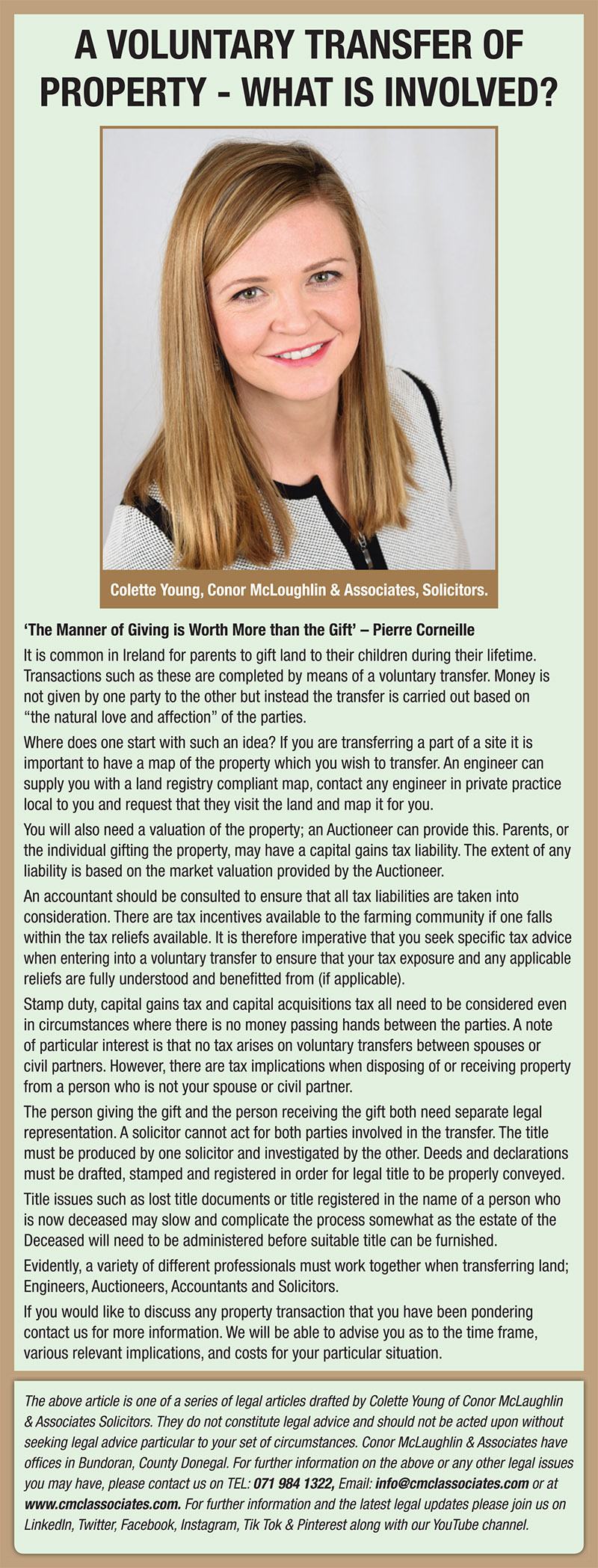
The Manner of Giving is Worth More than the Gift’ – Pierre Corneille
It is common in Ireland for parents to gift land to their children during their lifetime. Transactions such as these are completed by means of a voluntary transfer. Money is not given by one party to the other but instead the transfer is carried out based on “the natural love and affection” of the parties.
Where does one start with such an idea? If you are transferring a part of a site it is important to have a map of the property which you wish to transfer. An engineer can supply you with a land registry compliant map, contact any engineer in private practice local to you and request that they visit the land and map it for you.
You will also need a valuation of the property; an Auctioneer can provide this. Parents, or the individual gifting the property, may have a capital gains tax liability. The extent of any liability is based on the market valuation provided by the Auctioneer.
An accountant should be consulted to ensure that all tax liabilities are taken into consideration. There are tax incentives available to the farming community if one falls within the tax reliefs available. It is therefore imperative that you seek specific tax advice when entering into a voluntary transfer to ensure that your tax exposure and any applicable reliefs are fully understood and benefitted from (if applicable).
Stamp duty, capital gains tax and capital acquisitions tax all need to be considered even in circumstances where there is no money passing hands between the parties. A note of particular interest is that no tax arises on voluntary transfers between spouses or civil partners. However, there are tax implications when disposing of or receiving property from a person who is not your spouse or civil partner.
The person giving the gift and the person receiving the gift both need separate legal representation. A solicitor cannot act for both parties involved in the transfer. The title must be produced by one solicitor and investigated by the other. Deeds and declarations must be drafted, stamped and registered in order for legal title to be properly conveyed.
Title issues such as lost title documents or title registered in the name of a person who is now deceased may slow and complicate the process somewhat as the estate of the Deceased will need to be administered before suitable title can be furnished.
Evidently, a variety of different professionals must work together when transferring land; Engineers, Auctioneers, Accountants and Solicitors.
If you would like to discuss any property transaction that you have been pondering contact us for more information. We will be able to advise you as to the time frame, various relevant implications, and costs for your particular situation.
Download the Sligo Champion article
*The above article is one of a series of legal articles drafted by Colette Young of Conor McLaughlin & Associates Solicitors. They do not constitute legal advice and should not be acted upon without seeking legal advice particular to your set of circumstances. Conor McLaughlin & Associates have offices in Bundoran, County Donegal. For further information on the above or any other legal issues you may have, please contact us on TEL: 071 984 1322, Email: [email protected] or at www.cmclassociates.com. For further information and the latest legal updates please join us on Linkedln, Twitter, Facebook, lnstagram, Tik Tok & ?interest along with our You Tube channel.
